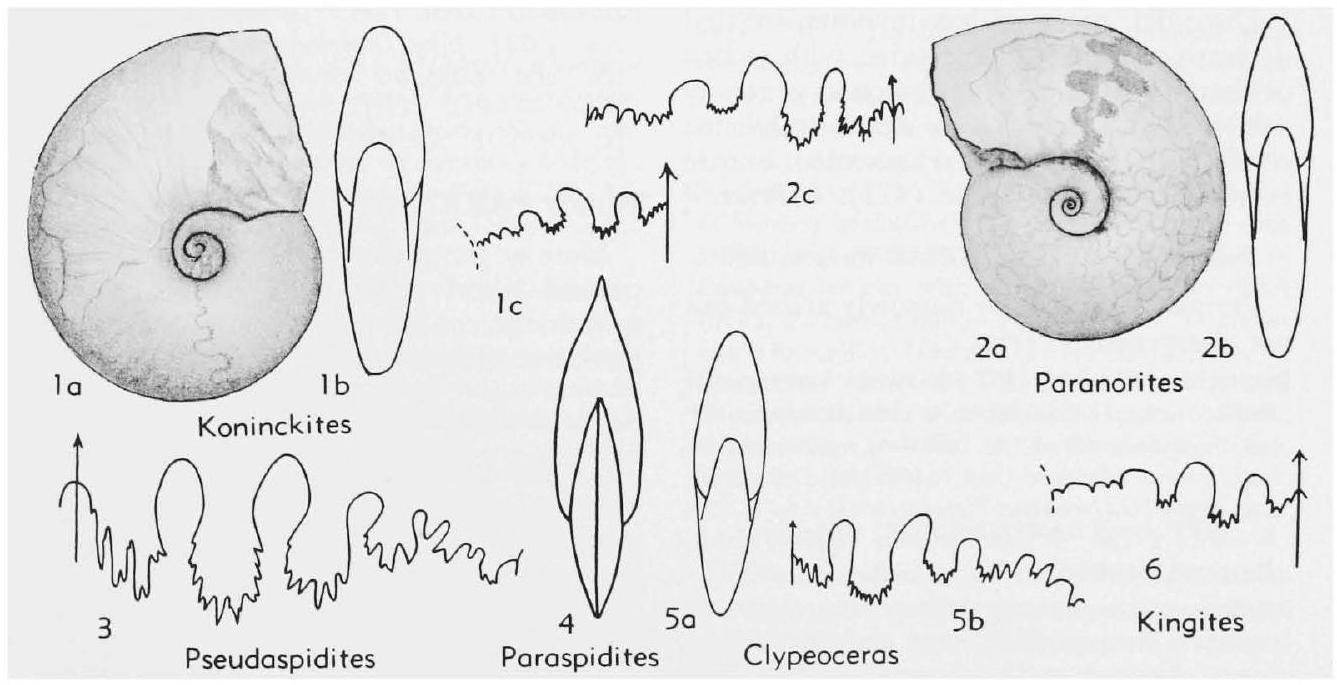Welcome to the Treatise on Invertebrate Paleontology!
Please enter a genera name to retrieve more information.

Koninckites
Classification
Phylum:
Mollusca
Class:
Cephalopoda
Subclass:
Ammonoidea
Order:
Ceratitida
Suborder:
Ceratitina
Superfamily:
Noritaceae
Family:
Paranoritidae
Formal Genus Name and Reference:
Koninckites WAAGEN, 1895
Type Species:
K. vetustus
Images
(Click to enlarge in a new window)
Fig. 170,1. *K. vetustus, SaltR., la,b, x0.7, 1c, x1 (548*)
Synonyms
Geographic Distribution
SaltR.-Himalaya-Mont.
Age Range
Beginning Stage in Treatise Usage:
Scyth.(Gyronitan)
Beginning International Stage:
Induan
Fraction Up In Beginning Stage:
46.2
Beginning Date:
250.97
Ending Stage in Treatise Usage:
Scyth.(Flemingitan)
Ending International Stage:
Olenekian
Fraction Up In Ending Stage:
48.9
Ending Date:
248.32
Description
Involute, compressed, with flattened sides and narrowly rounded to subtabulate venter, umbilical wall gently rounded. Suture with greater individualization of elements in auxiliary series.
References
Waagen, Wilhelm, 1895, Fossils from the Ceratite Formation: Same, ser. 13, Salt Range Fossils, v. 2, p. 1-323, pl. 1-40.
Museum or Author Information
Classification
Phylum:
Mollusca
Class:
Cephalopoda
Subclass:
Ammonoidea
Order:
Ceratitida
Suborder:
Ceratitina
Superfamily:
Noritaceae
Family:
Paranoritidae
Formal Genus Name and Reference:
Koninckites WAAGEN, 1895
Type Species:
K. vetustus
Images
(Click to enlarge in a new window)
Fig. 170,1. *K. vetustus, SaltR., la,b, x0.7, 1c, x1 (548*)
Synonyms
Geographic Distribution
SaltR.-Himalaya-Mont.
Age Range
Beginning Stage in Treatise Usage:
Scyth.(Gyronitan)
Beginning International Stage:
Induan
Fraction Up In Beginning Stage:
46.2
Beginning Date:
250.97
Ending Stage in Treatise Usage:
Scyth.(Flemingitan)
Ending International Stage:
Olenekian
Fraction Up In Ending Stage:
48.9
Ending Date:
248.32
Description
Involute, compressed, with flattened sides and narrowly rounded to subtabulate venter, umbilical wall gently rounded. Suture with greater individualization of elements in auxiliary series.
References
Waagen, Wilhelm, 1895, Fossils from the Ceratite Formation: Same, ser. 13, Salt Range Fossils, v. 2, p. 1-323, pl. 1-40.
